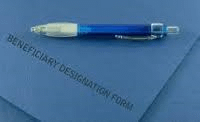Question: I have always heard that it is a good idea to review your beneficiary designations on financial accounts and life insurance policies periodically; do you have any suggestions?
Answer: The biggest issue I see is that people forget to update the beneficiaries on their financial accounts and life insurance policies. Many people designated a beneficiary when they opened their accounts. For many of my clients, this was 10, 20 or even 30 years ago!
Your life and wishes may have changed over the years. That is why it is advisable to periodically review all your beneficiary designations and amend any that are out-of-date. It is also advisable to name secondary beneficiaries. If you do not, and your primary beneficiary dies before you do, those accounts will be the subject of a probate or administration proceeding in the Surrogate’s Court. Depending on your family situation this can be costly and time-consuming.
With the above in mind, here are six reasons you might need to update your beneficiary designations:
1. You got divorced or remarried. New York law automatically revokes the beneficiary designation to the former spouse. However, if the designation is not updated, or a secondary beneficiary is not named, when you die, this account could be the subject of a probate or administration proceeding in the Surrogate’s Court.
2. You changed jobs and rolled over your retirement plan. When you move money from your former employer’s retirement plan into your new one or into an IRA, your beneficiaries lose any claim to those assets. You will want to ensure they are named as beneficiaries on the new account.
3. Your primary beneficiary died. In this case, you will need to update your designation. If you had also named a secondary beneficiary, he or she will move up to primary status, but you will now want to name a new secondary beneficiary.
4. Your financial institution changed ownership. When banks, brokerages or mutual funds merge, they sometimes drop the beneficiary designations for older accounts.
5. You had a child or grandchild. Do not designate a child under 18 as a beneficiary. If you do, a guardian of the property will have to be appointed to manage the assets until the child reaches age 18.Instead, if you want this child to inherit your financial assets, create a trust for his or her benefit and name the trust as the beneficiary. That way you control the terms under which your child or grandchild has access to the funds.
6. Your beneficiary became disabled. In this case, you will need to amend the designation or risk jeopardizing the beneficiary’s eligibility for government benefits. In this situation it is best to set up a Supplemental Needs Trust for the benefit of the disabled person and designate the trust as the beneficiary on your accounts.





